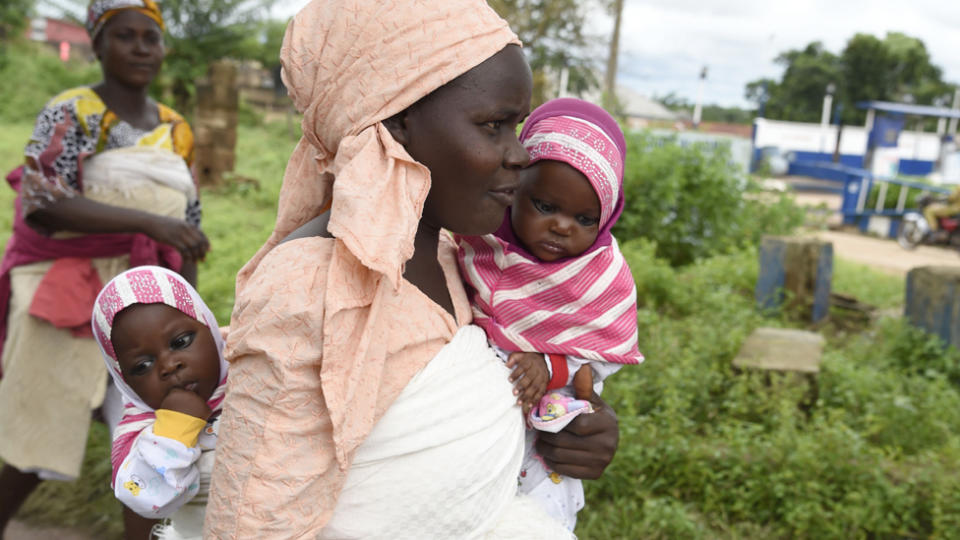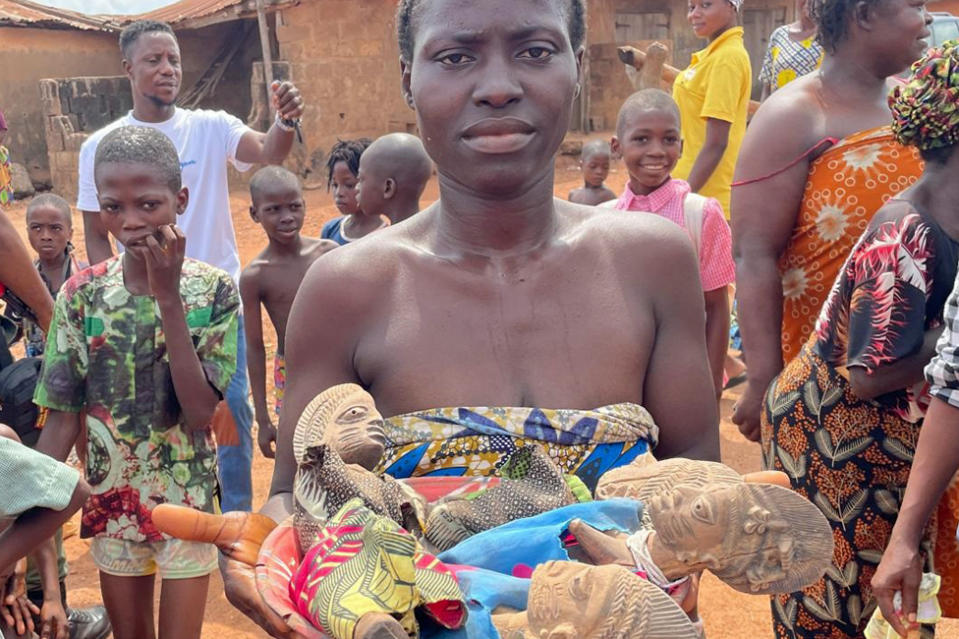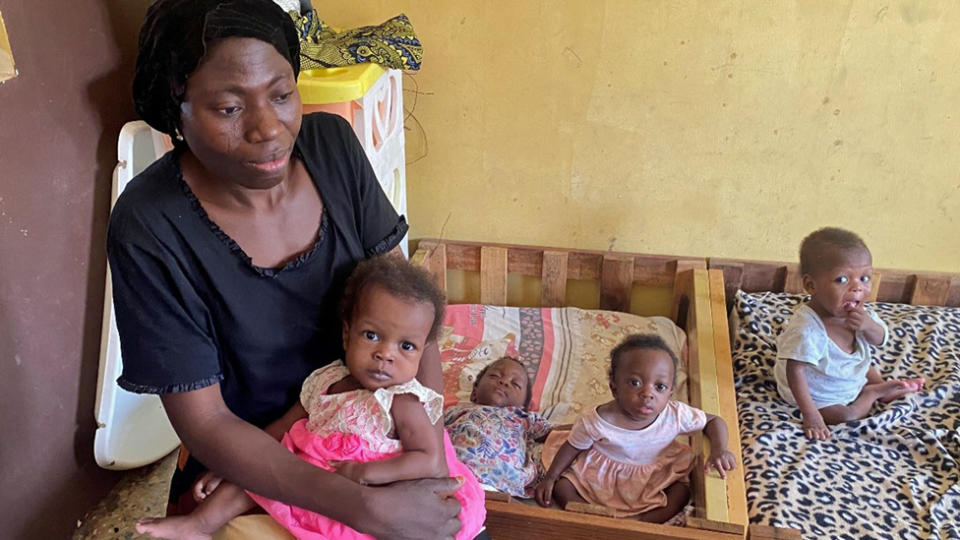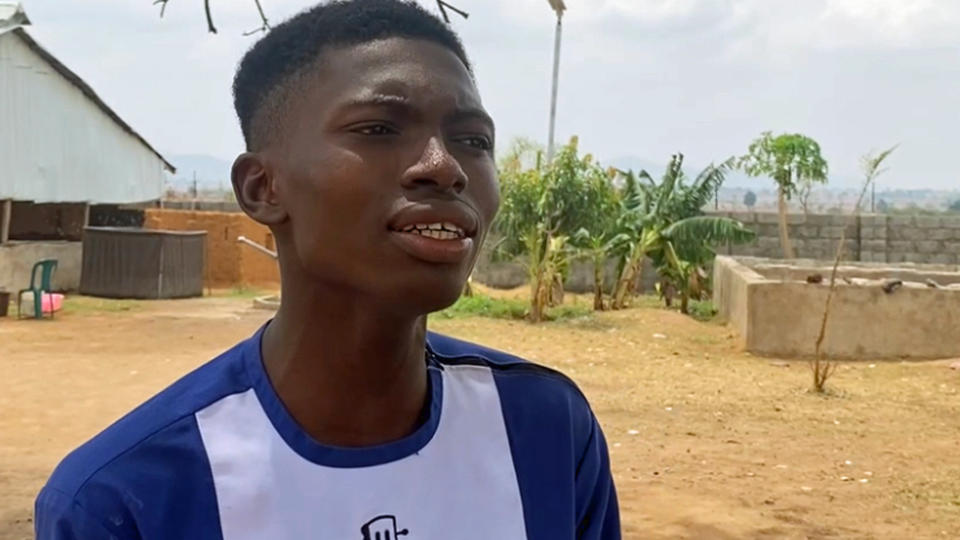Upon our arrival in Nigeria’s self-proclaimed twin capital to investigate the proliferation of multiple births in the small rural town of Igbo-Ora, we are greeted by the news that a woman has just given birth to a pair of healthy babies at the local clinic.
Their mother is a twin – her twin brother is in the nurse’s office taking photos of the new arrivals, her nephew and niece. Around the bed are the babies’ grandmother, who is also a twin, and their great-grandmother, who gave birth to two sets of twins.
“That’s how we do it here. We give birth to twins. It makes our town special,” the five-hour-old twins’ grandmother told the BBC.
“It makes us proud and we love them. We love our twins. They bring us success,” she says.
“People are disappointed if they don’t give birth to twins.”
It’s true that Igbo-Ora, in southwestern Nigeria, seems to have a higher number of twins than usual – walking around town it’s easy to spot younger pairs of twins, who tend to wear matching clothes.
The global average twin birth rate is about 12 per 1,000 births, but in Igbo-Ora it is about 45 per 1,000.
In Yoruba culture, which predominates in the southwest of the country, twins are a blessing and their names are predestined.

Regardless of gender, the older twin is called Taiwo, which means “the one who tests the world”, the younger one is called Kehinde, which means “the one who came after”.
The next day at Igbo-Ora secondary school we discovered that these names tend to dominate the roll call. When we ask a group of about 1,500 students during morning assembly to raise their hands if they are twins, or if they have a twin in the family, almost every hand goes up.
So why are there so many twins in the area?
According to oral folklore, the village was founded in the 14th century by an exiled prince from the Oyo Kingdom who was instructed to make specific offerings to the Yoruba gods in pairs and in return the village was blessed with twins.
Many locals attribute its fertility to a dish called “ilasa”, made with okra leaves. These spinach-like leaves are added to a pan of boiling water along with salt and spices, carob and melon seeds.
The reason behind Igbo-Ora multiple births is a veritable subject of study in Nigeria.
Only a minority of twins born in Igbo-Ora are identical – when one egg is fertilized and then divides.
Most are not identical, meaning multiple eggs are released and fertilized at the same time.
Researchers are looking into whether natural chemicals present in local foods, such as ilasa or perhaps even local yam, can cause women to produce multiple eggs.
Professor Akinola Kehinde Akinlabi, Dean of the Oyo State College of Agriculture and Technology, based in Igbo-Ora, believes genetics may have more to do with it.
The academic, who is a twin – and father of twins, says that someone born a twin here will have no difficulty finding a wife or husband.
“Twins are worshiped almost like deities who bring good luck and protection. People shower twins and their families with gifts, money and offers of help. All of this encourages people to marry people from twin-producing families,” he said. him to the BBC.
The city’s traditional ruler, known as the oba, eagerly awaits the results of scientific studies.
Jimoh Olajide hopes that in a country with a love for setting Guinness World RecordsIgbo-Ora will soon be officially recognized for its phenomenal fertility – as almost every house in the town has at least one set of twins.
“My vision for this city is to see us hold the world record for the most multiple births worldwide,” says Oba Olajide, who is, of course, a father of twins.
“The things that will follow will be tourism, hotels.”
With this in mind, the city launched an annual international twin festival several years ago.
Professor Akinlabi hopes that the focus on twins will also lead to investments so that the wider community can tackle problems such as its aging and ill-equipped health centers.
Such is the status of the twins that, despite the adoption of Islam and Christianity in this area, the traditional Yoruba cult of them still prevails.
Kehinde Adeleke, our local guide and youngest twin, takes us to witness a ritual offering, including palm wine and beans, to the twin gods at a shrine in her family’s community.
“I feel especially blessed as a twin,” says Adeleke, who has two children but has not yet had multiple births.
“I’ll be disappointed if I don’t have twins – they’re the twins I need,” she admits amid the drumming and singing at the ceremony.


Such attitudes were complete anathema to some members of the minority Bassa-Komo community near the capital, Abuja. Twins for them have been a source of fear.
In the mid-1990s, Nigerian missionary Olusola Stevens heard that villagers in this remote, undeveloped area thought the twins were evil and were dying mysteriously.
Such beliefs were not unheard of in Nigeria – especially in the southeast of the country, where different communities killed twins, although such practices ended long ago.
Pastor Stevens, based in Gwagwalada, about 600 km (500 miles) northeast of Igbo-Ora, decided to investigate.
“We started going from community to community asking, ‘Where are the twins?’ The normal answer was that the gods had killed them. In fact, in some cases, the mother did not breastfeed them, so they died naturally,” he says.
The missionary discovered that babies were sometimes given a mixture of plants that prevented them from gaining weight.


It is not clear why such children were considered unlucky, but it may be that in the past they were associated with deprivation and an increased risk of maternal mortality.
Pastor Stevens and his team began rescuing these children and created The Vine Heritage Home orphanage, which currently cares for around 200 children.
To change attitudes, they began by providing medical care to villages and wells for access to clean water.
The orphanage also works with the charity Action Aid on an EU-funded outreach programme, while the government has also run a major awareness-raising initiative.
As a result, many in the Bassa-Komo community now keep their twins, but if the parents are still worried or in trouble, they hand the children over to the orphanage – and visit them there.
In fact, 27 of the children grew up and accepted invitations to return to live in their family’s village – although it was not always an easy decision for them.
“The first time I saw my biological father was when I turned 18 – I was angry because he abandoned me,” says Olufemi Stevens, known by the nickname “Wonder Boy”.


He grew up in the orphanage after his mother died during childbirth, but is glad he had enough courage to return home: “When they saw me, they realized that these children are not bad.
“And when I came back I was surprised to see some twins with their own mother. My plan is to go back and open a school for them – education is the key.”
In some ways, children at the orphanage are in high demand because they have received a level of education that is unattainable for most in their own community.
Pastor Stevens recognizes that the twins will never be as welcome as they are in Igbo-Ora, but he is hopeful that one day their services will no longer be needed.
You can listen to the documentary Twin Cities on BBC World Service on Thursday, May 9, 2024.
Go to BBCAfrica.com for more news from the African continent.
Follow us on Twitter @BBCAfricaon Facebook at BBC Africa or on Instagram at bbcafrica





































